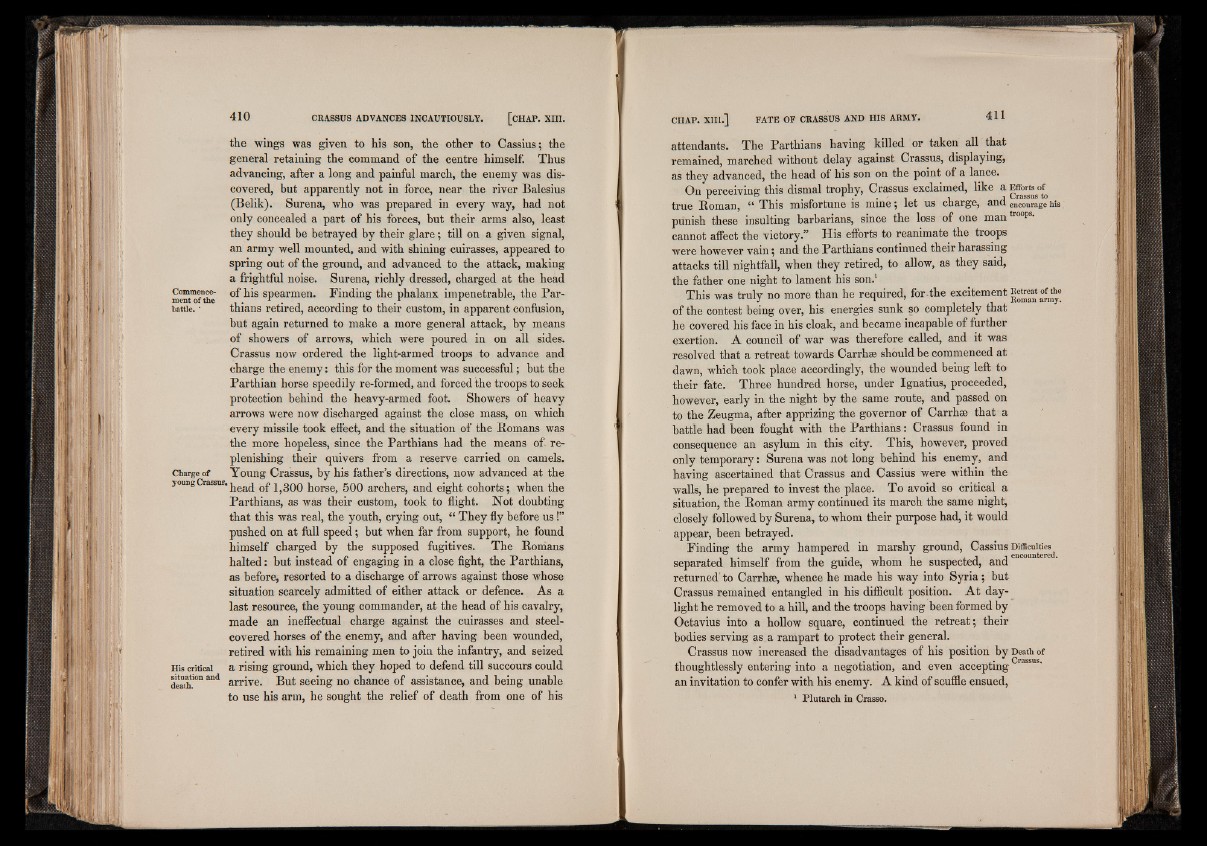
the wings was given to his son, the other to Cassius; the
general retaining the command of the centre himself. Thus
advancing, after a long and painful march, the euemy was discovered,
but apparently not in force, near the river Balesius
(Belik). Surena, who was prepared in every way, had not
only concealed a part of his forces, but their arms also, least
they should be betrayed by their glare; till on a given signal,
an army well mounted, and with shining cuirasses, appeared to
spring out of the ground, and advanced to the attack, making
a frightful noise. Surena, richly dressed, charged at the head
ment^ftfie °f tis spearmen. Finding the phalanx impenetrable, the Par-
battie. • thians retired, according to their custom, in apparent confusion,
but again returned to make a more general attack, by means
of showers of arrows, which were poured in on all sides.
Crassus now ordered the light-armed troops to advance and
charge the enemy: this for the moment was successful; but the
Parthian horse speedily re-formed, and forced the troops to seek
protection behind the heavy-armed foot. Showers of heavy
arrows were now discharged against the close mass, on which
every missile took effect, and the situation of the Bomans was
the more hopeless, since the Parthians had the means of- replenishing
their quivers from a reserve carried on camels.
Charge of Young Crassus, by his father’s directions, now advanced at the
young Crassus, 0 f ^ 3 0 0 horse, 5 0 0 archers, and eight cohorts; when the
Parthians, as was their custom, took to flight. Not doubting
that this was real, the youth, crying out, “ They fly before us!”
pushed on at full speed; but when far from support, he found
himself charged by the supposed fugitives. The Bomans
halted: but instead of engaging in a close fight, the Parthians,
as before, resorted to a discharge of arrows against those whose
situation scarcely admitted of either attack or defence. As a
last resource, the young commander, at the head of his cavalry,
made an ineffectual charge against the cuirasses and steel-
covered horses of the enemy, and after having been wounded,
retired with his remaining men to join the infantry, and seized
His critical a rising ground, which they hoped to defend till succours could
death!0n arrive. But seeing no chance of assistance, and being unable
to use his arm, he sought the relief of death from one of his
attendants. The Parthians having killed or taken all that
remained, marched without delay against Crassus, displaying,
as they advanced, the head of his son on the point of a lance.
On perceiving this dismal trophy, Crassus exclaimed, like a Eflbrte^
true Boman, “ This misfortune is mine; let us charge, and encourage h is .
punish these insulting barbarians, since the loss of one mantroops-
cannot affect the victory.” His efforts to reanimate the troops
were however vain; and the Parthians continued their harassing
attacks till nightfall, when they retired, to allow, as they said,
the father one night to lament his son.1
This was truly no more than he required, for-the excitement
of the contest being over, his energies sunk so completely that
he covered his face in his cloak, and became incapable of further
exertion. A council of war was therefore called, and it was
resolved that a retreat towards Carrhse should be commenced at
dawn, which took place accordingly, the wounded being left to
their fate. Three hundred horse, under Ignatius, proceeded,
however, early in the night by the same route, and passed on
to the Zeugma, after apprizing the governor of Carrhae that a
battle had been fought with the Parthians: Crassus found in
consequence an asylum in this city. This, however, proved
only temporary: Surena was not long behind his enemy, and
having ascertained that Crassus and Cassius were within the
walls, he prepared to invest the place. To avoid so critical a
situation, the Boman army continued its march the same night,
closely followed by Surena, to whom their purpose had, it would
appear, been betrayed.
Finding the army hampered in marshy ground, Cassius Difficnities
. encountered. separated himself from the guide, whom he suspected, and
returned' to Carrhae, whence he made his way into Syria; but
Crassus remained entangled in his difficult position. At daylight
he removed to a hill, and the troops having been formed by
Octavius into a hollow square, continued the retreat; their
bodies serving as a rampart to protect their general.
Crassus now increased the disadvantages of his position by Death of
thoughtlessly entering into a negotiation, and even accepting rassus‘
an invitation to confer with his enemy. A kind of scuffle ensued,
1 Plutarch in Crasso.